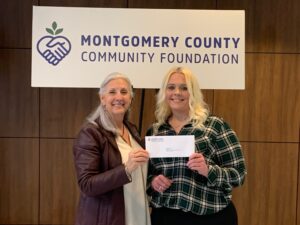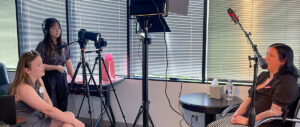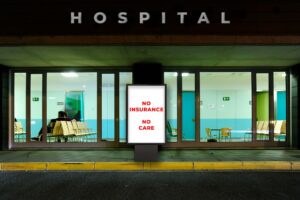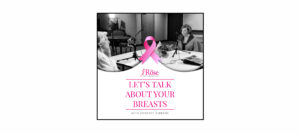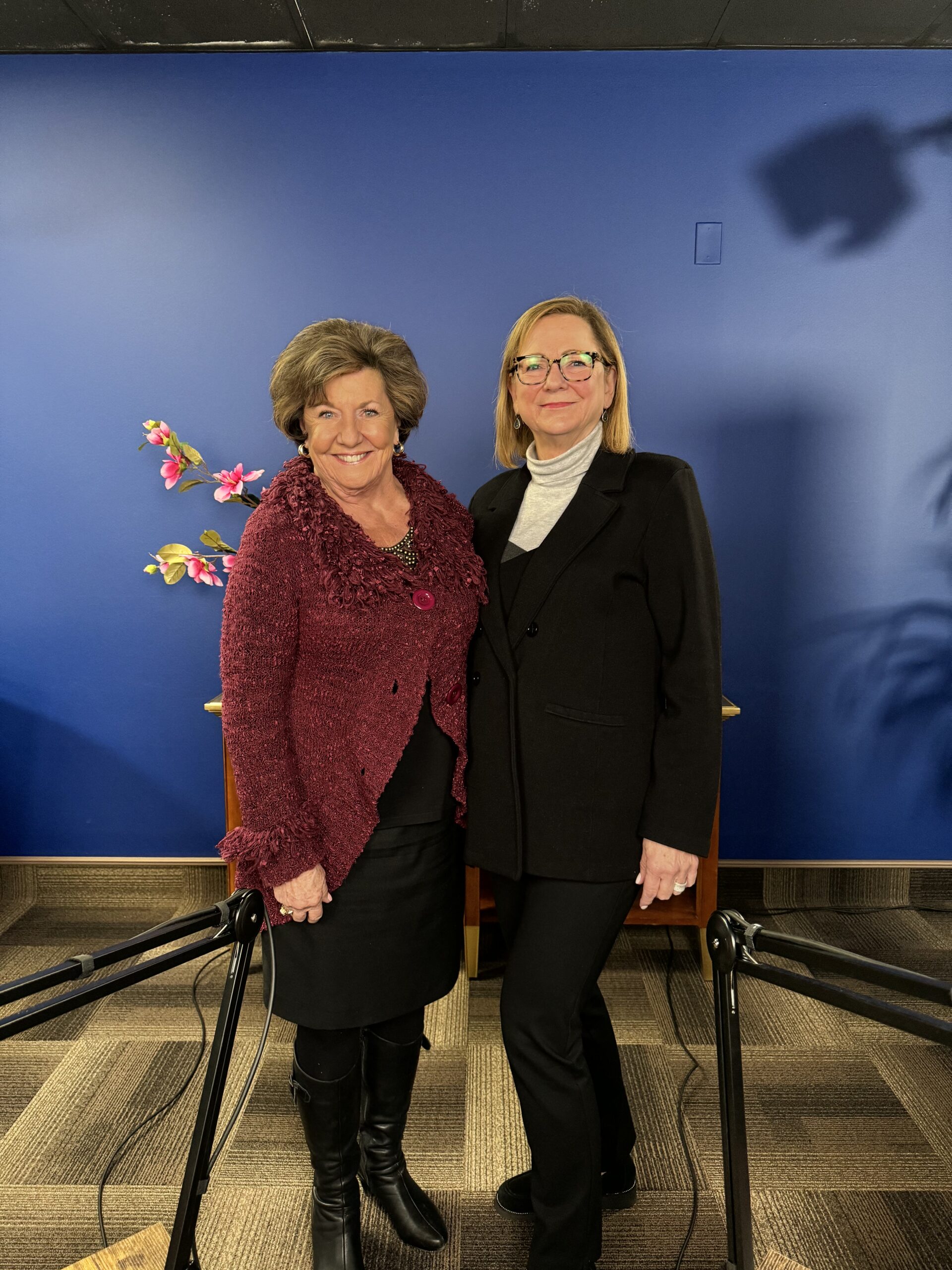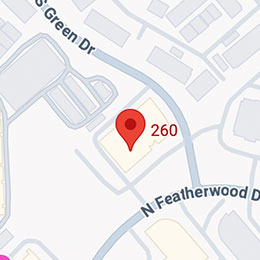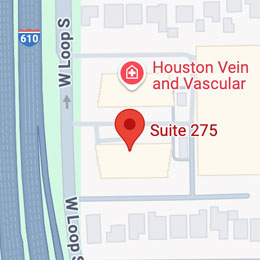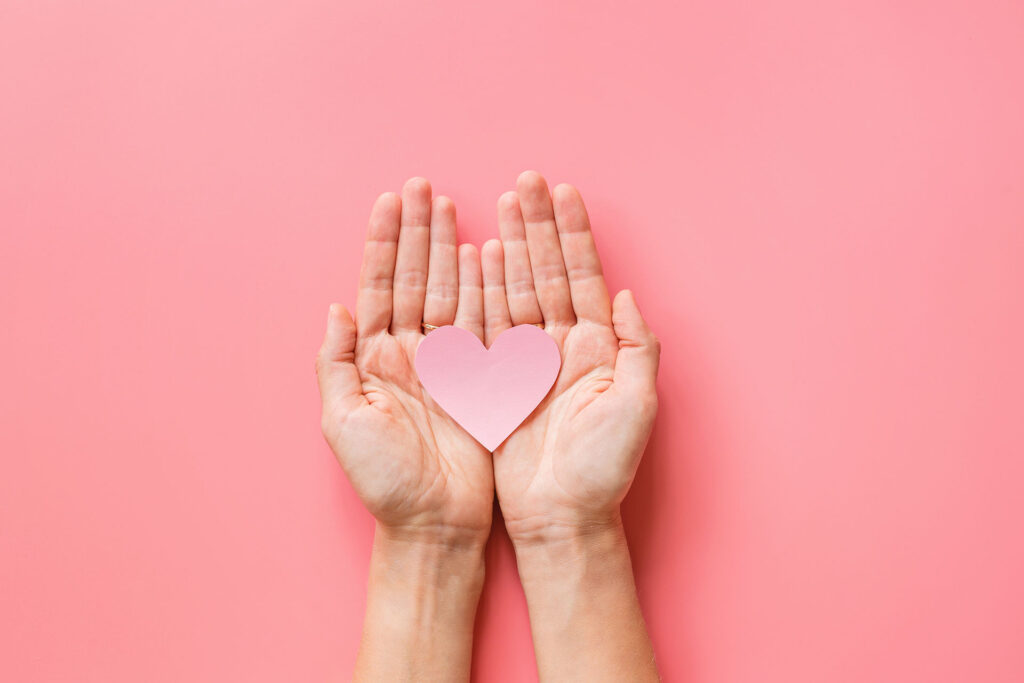Dorothy: [00:00:00] The Rose’s annual Everything’s Coming Up Rose’s Luncheon happens on March 27th. This year’s honoree is Nancy Craig. We couldn’t have found a better advocate than Nancy, and you’ll hear why. Today, she joins the show to discuss her role as a volunteer and how that convinced her how important it was to be part of our efforts to spread the mission of The Rose.
She shares her personal experience with breast cancer and why she feels that early detection saved her life. Nancy’s conversation really does dive into the importance of community trust, reaching young women, breaking the language barriers, and also the need for unrestricted funds. Mark your calendar for March 27th because you’re sure to have a great time and you’ll help us help the women of The Rose. Help us share the mission of The Rose by subscribing to Let’s Talk About Your Breast on your favorite podcast platform and by sharing with your family and friends.[00:01:00]
Let’s Talk About Your Breast, a different kind of podcast presented to you by The Rose. A breast center of excellence and a Texas treasure. You’re gonna hear frank discussions about tough topics and you’re gonna learn why knowing about your breast could save your life.
So Nancy, it is so wonderful to have you, and Let’s Talk About Your Breast. And I can’t thank you enough for accepting the role as honoree of our annual luncheon. Everything’s Coming Up Roses. So tell us what that means to you to be an honoree of this luncheon.
Nancy: Well, Dorothy, I want to thank you and thank the people at The Rose, first of all, for, for thinking of me as an honoree.
I have spent the last number of years thinking about The Rose, learning about The Rose, educating myself about The [00:02:00] Rose, and talking to so many people who know about and love The Rose. So it means so much to me to, um, To have this recognition as an honoree and, um, you know, I just hope that I can, can fulfill it.
I have talked to everyone I know and, um, you know, it, it really gives me more of a voice for The Rose. To try to encourage people to attend the luncheon, to find out about The Rose, all of those things.
Dorothy: I had never thought of that. Nancy gives you more of a voice. Absolutely. Of course it does. Absolutely.
You know, we were just so excited when you said, Oh yes, I’ll accept that.
Nancy: Well, you’re so sweet. And people will stop me and say, You’re being honored by The Rose. Tell me about it. Tell me about the luncheon. Tell me about So I really, really hope that, that These people that are reaching [00:03:00] out to me are responding.
Dorothy: Oh, yeah. Oh, yeah. We’ve had great response. And we know this is going to be a wonderful luncheon. But it’s kind of like what you’re saying. It gives us an opportunity to share the story of The Rose with a lot of people that may not know about this.
Nancy: Exactly.
Dorothy: It, it’s just, uh, so often I have people say, oh, you know, I can’t believe this person didn’t know about The Rose.
Well, it’s a big city.
Nancy: That’s so true. That is so true, Dorothy.
Dorothy: And believe me, if you don’t ever need our services, we might not ever show up on your radar. So, yeah. So, uh, you’ve already said that you’ve been learning about The Rose. You actually were on our very first host committee.
Nancy: Exactly. Yes .
Dorothy: Yeah. Yeah. You were part of the luncheon chair, uh, the luncheon committee. And.
Then was it the next year that.
Nancy: It was, uh, I think it was 2019 that I chaired the luncheon and, um, [00:04:00] you will probably remember as we all do that with the COVID, um, we could not actually have the luncheon in person. And, um, it was fairly late in the process that, that we had to cancel it. But I will say that the response was amazing.
We did an audible. If that’s what you call it, or a, you know, kind of a video, uh, presentation where we had our speaker and the two honorees. And, um, you know, people just responded tremendously to all that.
Dorothy: It was a great fundraiser.
Nancy: It was wonderful, but I certainly missed
Dorothy: Being able to do it in person.
Nancy: Being able to do it in person.
Dorothy: Yes, yes.
Nancy: And give all those hugs and good things that we do. Yeah, yeah.
Dorothy: Well, now, of course One of the reasons that we ask you to be an honoree is because you have had the breast cancer experience. I mean, we, we are [00:05:00] so, uh, deliberate about making sure those honorees that we have actually know what someone experiences when they have that diagnosis of breast cancer.
So now, I know you’re, you are a long term survivor, but tell us, How old you were then? How it was found?
Nancy: I will start out by saying that I’m a 15 year survivor.
Dorothy: Ah, absolutely wonderful.
Nancy: And, um, just as a little aside, um, I am adopted. So I have absolutely no medical history from my birth parents. So always, um, you know, in the back of my mind was, you need to be diligent about the things that you look out for with yourself .
And to be perfectly honest, um, Early on, everyone that I knew that had cancer, and I’m [00:06:00] talking like back when I was in my 20s, 30s, 40s, um, died within two years. And my father was diagnosed with colon cancer when I was 20, and he died. And there was so little that they could do about so many of those cancers.
Well, most of them, uh, Back in the day, but my situation, um, I had started out early doing mammograms at the direction of my doctor and I also wanted to do that and so I was doing them at Methodist Hospital and I got a call that, uh, they were seeing something on the mammogram and so come back in and I went back in and we discussed it and, um, then they said that What they thought they were seeing was DCIS, ductal carcinoma in situ, if I’m saying that right. Anyway.
Dorothy: Pretty close. In situ.
Nancy: And a Methodist was amazed that they [00:07:00] found it because it was very, very high up. Not in the usual And I was very glad they found it. Well, the next step was I contacted MD Anderson and had a wonderful doctor. She’s long retired, but Dr. Eva Singletary, Singletary, uh, walked me through everything.
And, um, after the biopsies and, um, they did surgery, they did a lumpectomy and removed a number of, um, lymph nodes. And she, um, You know, we talked a lot about mastectomy versus lumpectomy, and, um, she said, you know, Nancy, if I get in there and what I see directs me to do a total mastectomy, then I will certainly do that.
So that, that is how I went into surgery. And fortunately, she only had to do the lumpectomy. So, and then I followed with, uh, radiation. [00:08:00] But I cannot tell you how my faith and my husband and my brother and his wife and my family and my friends. I’ll pull together. And I was so blessed to have that kind of diagnosis in the beginning.
And I really, really felt like it was early detection. I really did, Dorothy, because it was grade 2, which even with the DCIS, they said could spread faster and, and might come back easier. So, um, You know, I was, I was so blessed that I paid so much attention to that. And I had friends, um, who had been supporters of mine who ultimately, within the next two or three years, were diagnosed with, uh, breast cancer.
And they are still survivors. So, you [00:09:00] know, we, we just We just don’t know.
Dorothy: Right.
Nancy: It’s the scariest thing in the world going into, especially when you’ve seen a lot of circumstances with, with, uh, cancer prior to. Actually, my father’s mother had cancer. And, uh, she had a mastectomy where they took all the muscle and everything out of her arm and, and under, and, um, you know, so, so I had seen that as a young child.
So that was really, it was really, really scary for me. But we are so blessed to be in a city where we have The Rose and The Rose is making such a difference and we had a bay house in Calhoun County Right next to Matagorda County where your van goes and that van Is such a gift to all these women in [00:10:00] these smaller communities a lot of them don’t have Clinics, they don’t have a lot of Doctors, if they have any doctors, they don’t have any kind of medical assistance.
You know, they may have to drive two hours or so to Corpus Christi or to, to wherever to get any kind of medical help. So that is just revolutionary in taking care of this.
Dorothy: Well, I’m so glad you brought that up, Nancy, because you’ve seen it. You’ve lived in a County that doesn’t have those facilities.
Nancy: Absolutely. Absolutely.
Dorothy: Folks just don’t appreciate I think unless you’ve been there How different urban rural medicine is and and even it’s it’s not just access It’s not just bringing the mammo coach there. It is Also that feeling of, uh, uncertainty, you know, that we really have to have that community [00:11:00] trust.
Nancy: Exactly.
Dorothy: Because if you’re not from the city, you’re, you know, uh, you just don’t fit in here, yeah.
Nancy: Well, you know, and that, that is so true. And, and just sitting here for a minute when I walked in and waiting, there were There was woman after woman after woman coming through the door, um, checking in. And it, it’s so wonderful to see that, that y’all are really, are being visited and, um, you know, I think your footprint is so much larger now than it was, say, maybe, Five or 10 years ago.
Dorothy: Absolutely. Those, uh, mammography coaches have changed.
Nancy: Absolutely.
Dorothy: All the ways that we do, that we do service anymore.
Nancy: Absolutely.
Dorothy: It’s just, they have been, uh, transitional for us.
Nancy: Well, and Dorothy, as you know, it’s all about trust.
Dorothy: Oh, yes.
Nancy: It is so about trust. When you walk in that door, or when you [00:12:00] get that diagnosis, and you go from one doctor to the next, and you’re thinking, oh, you know, are they Are they really caring about me?
Are they really here to? You know, is this the best place for me to be? Well, once you walk in the door at The Rose, there’s no question about that. There is no question about that. You know that and how wonderful you and Dixie back in the day had such a vision.
Dorothy: Oh.
Nancy: That it is just, it is just amazing.
Dorothy: Oh, thank you.
Nancy: Now, tell us how many years you’ve been doing this. Thirty seven.
Dorothy: 37. But, Nancy, The Rose is always, always dependent on the community.
Nancy: Exactly.
Dorothy: On the generosity of the community.
Nancy: Exactly.
Dorothy: Events like the luncheon, I, I cannot tell you how once we, uh, started that luncheon and started having some visibility inside the group, you know, it just.
Nancy: Right.
Dorothy: [00:13:00] Certainly made a difference in our fundraising efforts. You know, no matter what, there’s always a need.
Nancy: That is so true.
Dorothy: I, I think, okay, we’ve reached the maximum number of women we can possibly serve. I mean, this is, this is it. And then the next year it’ll be.
Nancy: It’ll be more.
Dorothy: Another 500.
Nancy: Exactly, Dorothy, exactly.
Dorothy: So the fundraising doesn’t stop.
Nancy: Well, and I saw reading some things that, that actually some groups are reaching out to you.
Dorothy: Yes.
Nancy: And, and saying we want to support you this way.
Dorothy: Yes.
Nancy: And, you know, maybe with a mobile unit or with, with, with whatever. And so that is just worth its weight in gold.
Dorothy: Oh, it is, it is.
We are. We are very pleased at the progress we’ve made, but again, it’s because we’ve had that support.
Nancy: Right.
Dorothy: I just, I love that I have this opportunity to thank not just you, but all the people that have anything to do with the luncheon or any of the [00:14:00] events that raised money for us.
Nancy: Exactly, exactly.
Dorothy: Yeah, it’s um, Just there’s no way to really convey how much it means.
We could get grants.
Nancy: Uh huh, exactly.
Dorothy: But there’s so many restrictions on them.
Nancy: Well that’s, that is so true.
Dorothy: You know, you either have to serve a 40 year old or they have to live in a certain county or, you know, whatever. But with, with Fundraisers like this, where we have those unrestricted, uh, funds,
Nancy: Right.
Dorothy: mean that we can serve so many more. And, you know, who falls in that group are mostly the young women.
Nancy: Yes.
Dorothy: Because every program out there is made for those older women.
Nancy: Yes. I was going to mention that. And I have a daughter now who is, um, 36. And I want her to be educated. Well, she is pretty educated about all this, having gone through my cancer with me and still ongoing.
You know, even though it’s been 15 years, I’m [00:15:00] still having an annual mammogram. And, um, but, but that is so true. Reaching. Reaching that young audience, and I think more and more of that is going on. Because you see that at the luncheons, that there are more younger people, more younger people coming, which is such a blessing, such a blessing.
Dorothy: So Nancy, you touched upon something about that annual visit you make.
Nancy: Mm hmm.
Dorothy: Does it fill you with fear, or do you, have you come to grips with this is something I do, or do you worry?
Nancy: Well, you know, really and truly, I, um, one thing I will say, I have a very strong faith, and I think that, that that has helped me resolve fear.
There were, there was a great deal of fear. Let’s say for the first five years when my, when my children were younger while they were in college and, and, um, you know, you, [00:16:00] it’s just never far away. I will say that. I will say that. But through conversations with friends and supporters and people who know much more about it than me, it, it really has taken that fear away.
Dorothy: And we need to talk to others.
Nancy: Oh, absolutely. Absolutely.
And you know what? I done so much volunteer work back in the day. And you know, when I was getting involved with The Rose, we had COVID. And then not too long after that, my, um, husband became ill. And so really, I just stepped back, you know, from everything that I was doing to help be a caretaker for him.
But I would love to get more involved in The Rose. I mean, I hear from these women who, you know, have had breast cancer and been through All of the different things that you go through that the surgery and radiation and chemo and and the medications that you [00:17:00] take afterwards and and recurrences in a few years and all of those things that that I have been blessed enough not to experience but there there is such a need out there and and The Rose is filling a huge part of it.
Dorothy: I really do feel we are.
Nancy: Yes. Oh, absolutely.
Dorothy: We are taking care of those folks at Just fall through the cap.
Nancy: Absolutely.
Dorothy: They are always, uh, they make too much money from their two or three jobs.
Nancy: Right.
Dorothy: That they’re holding down at minimum wage to qualify for some programs.
Nancy: Right.
Dorothy: But they don’t make enough to actually be able to afford insurance.
Nancy: And see, that is so difficult. And, you know, who knows what’s going to happen with the health insurance.
Dorothy: Right.
Nancy: It’s just an unknown, and I don’t know this for a fact, but a lot of the companies are making So many different exceptions now that you think you’re covered. We all need to read the fine print, but, but you may not [00:18:00] be.
You just may not be with that very thing that you need.
Dorothy: Yes, we’re seeing that a lot.
Nancy: I bet you are, Dorothy, and isn’t that, that’s so sad.
Dorothy: So many have had to go with the huge deductibles.
Nancy: Yes.
Dorothy: And you know, we do that so that the premiums are down, but that means that when we do need something
Nancy: exactly.
Dorothy: Money, it’s just hard to come.
Nancy: A lot of people. Yes, exactly, exactly.
Dorothy: So, Nancy, what, what, uh, do you have a personal goal with the luncheon ?
Nancy: My personal goal with the luncheon and, uh, Janet’s goal with the luncheon, uh, Janet Lionberger, who is the, uh, co chair of the luncheon, is really and truly, like I said, to have more of a voice. And, and to really, really try to get the word out so that we can, you know, bring in maybe a different group, maybe more, um, uh, [00:19:00] you know, every year it’s so different because the, you know, the chair has their group, but then, you know, you want, you want to bring in.
More people. And actually, really and truly, you know, I know there have been some men who are attending the luncheons.
Dorothy: Yes. And those are, it’s wonderful to look at among all the beautiful clothes and dresses and everything. And here’s these strong men.
Nancy: Right. And you know what, that’s something else that we don’t really think about very often.
Dorothy: No. They do, they do develop breast cancer, yes.
Nancy: Absolutely.
Dorothy: And if they haven’t, they’re many times the caregiver. To, to a wife.
Nancy: That is so true. Yes.
Dorothy: Or daughter, or mother. Yes.
Nancy: Exactly. And that is not an easy job.
Dorothy: Mm-Hmm.
Nancy: because they don’t have the history and the education that we do.
Dorothy: Mm-Hmm.
Nancy: about breast cancer.
Dorothy: No.
Nancy: You know, they’re just kind of walking into it blind, which I think makes it so hard for them. When we are [00:20:00] diagnosed because they don’t really see all the options and know all the things where we are today that can help. So it’s an education for them as well.
Dorothy: But you know Nancy, you touched upon that at the beginning so many times.
No matter how far we’ve come, in the back of our mind is, Oh my gosh, I have cancer, that’s a death sentence.
Nancy: Well, you know, that’s so true.
Dorothy: And, you know, you’re absolutely right. The changes in medicine have, oh, they’re just so different now.
Nancy: Exactly.
Dorothy: Treatment, detection, all of it is so different.
Nancy: Well, you know, when I read something, and I don’t know, um, you know, if this is a hundred, 100 percent true, but they were saying that if, if you get an early diagnosis, there’s a 98 percent chance that you can survive.
Dorothy: Yes, yes.
Nancy: And that is major 98%.
Dorothy: So it’s so important that early diagnosis. And that’s what I [00:21:00] heard you talk about more than anything.
Nancy: Yes, yes, yes. And particularly, you know, not having any medical history, but whether you have medical history or not, that’s not a guarantee. And, um, if you’re going to have it, or if you’re not going to have it, you know, that there are no guarantees when it comes to our health, at all, even with all the genetic testing, you know, it just makes you aware.
Dorothy: Every year, there’s some other part of the gene that they’re finding that could contribute. So, I agree. Being aware is one of the most important things.
Nancy: Exactly.
Dorothy: Knowing your breast. Being aware, doing the screening, following up, all those things.
Nancy: Knowing your breast, exactly.
Dorothy: Those are all part of self care.
Nancy: Now, are you advocating younger age for women to start.
Dorothy: Oh, I would. However, you know, until it is recommended, uh huh, by [00:22:00] the powers that be.
Nancy: Right.
Dorothy: We really, really have trouble getting women in just for screening.
Nancy: Right.
Dorothy: If they’re under 40.
Nancy: Right.
Dorothy: And invariably, if they are insured, it’s going to go against their deductible, because it’s called diagnostic.
Nancy: Well, that’s very true, Dorothy.
Dorothy: But that would be one of the things I would love to see changed. I’d love to see that age drop, and especially in our black community. I mean, that is just outrageous that we are not able to do screening at a younger age.
Nancy: Exactly.
Dorothy: Because that cancer that hits the younger black woman is going to be aggressive.
Nancy: That’s so true.
Dorothy: We’ve got to fight it.
Nancy: That is so true. Well, and Um, they are saying now that so many, they are saying they, well who is they, I’m not sure, but anyway, um, that so many more young women are being diagnosed with not just breast cancer but different cancers.
Dorothy: Different kinds of cancers.
Nancy: And [00:23:00] they really don’t have an answer to that.
If it’s environmental or you know, whatever, they just really, really don’t know at this point.
Dorothy: But Nancy, we’ve never had an answer for cancer.
Nancy: Yes, that’s, that’s exactly right.
Dorothy: You know, we’ve made a lot of strides in how we treat cancer, but we still don’t know.
Nancy: I’m glad you said that. You know, there’s not a magic bullet there.
Dorothy: No.
Nancy: There is not.
Dorothy: No.
Nancy: There is not.
Dorothy: So I’m curious, as a long term survivor,
Nancy: Mm hmm.
Dorothy: and I know you’ve mentioned your faith, but is there a ritual or a, any certain thing you do that impacts your attitude that, you think is beneficial to, to survivors?
Nancy: I think just communicating. with other survivors. And, and that’s not all we talk about, but what happens is we become good friends.
Dorothy: Yes.
Nancy: You know, some of the women who you [00:24:00] meet, who you, who you might not necessarily, uh, be doing things with or seeing very often, that you become wonderful friends. And that’s not always everything you talk about. but I think the thing that has really saved me is just doing the testing. It’s just doing the testing because that is the only thing.
I mean, I can say, well, there are no lumps. Well, hello. I mean, you know, that, that is. That is not valid at all. And um,
Dorothy: or if you have DCIS.
Nancy: Well that’s exactly right.
Dorothy: Not gonna have a lump. Right.
Nancy: That’s exactly right. And um, so really and truly the testing is so important. And I know they say, well, you know, maybe if you’re younger or something, they have so many tests where maybe you have a false positive.
Well, you know, I think things are advancing [00:25:00] now. Maybe more with our testing, you know, the 3D mammograms, I think have helped maybe a lot of that.
Dorothy: Absolutely, you can see so much more.
Nancy: Don’t you think, Dorothy, where it’s more precise?
Dorothy: But what I, but what bothers me most about that, oh, you have false positives.
Nancy: Mm hmm.
Dorothy: You know what? I’d take that any day if it ruled out a problem.
Nancy: Right.
Dorothy: Any day.
Nancy: Exactly.
Dorothy: And there’s this attitude out there that women can’t handle it. What? There’s not much a woman can handle. I truly believe that.
Nancy: I believe that as well. And you have seen that on every single level.
Dorothy: Absolutely. So, you know, we, we need to dispel some of the, uh, Some of the myths.
Nancy: Some of the myths.
Dorothy: Around that.
Nancy: Right. Right.
Dorothy: And also alleviate some of the fear.
Nancy: Right.
Dorothy: I, I truly understand if a woman finds something, she may postpone that. exam just [00:26:00] because she hopes it goes away. But, as you said, we can’t stress enough, go ahead and get it checked.
Nancy: Yes. Yes. And that is so worth your peace of mind.
Dorothy: Oh, yes.
Nancy: You know what? It’s just, um, you know, prayer is a very strong thing, but until you have that, um, Actual test that says, you know, you are okay. You are clear.
Dorothy: And you know, I heard you say something else, and that has to do with intuition. Knowing that you’re in the right place.
Nancy: Yes.
Dorothy: And, you know, I’ve said many times, I think part of the recovery process is how much you trust that doctor.
Nancy: That is so true, Dorothy.
Dorothy: And, because if there’s any question, then you need another opinion.
Nancy: That is so true. And I think people hesitate to do that. I think, um, you know, I hope, my hope is that they’re getting a little more attuned with that. Um Because I’ve [00:27:00] heard of several. different cases where, you know, one thing was said and then another thing was, was determined.
So, you know, it just behooves us, follow through. Follow through. You know, don’t, if you get a mammogram that’s questionable or definitely has Cancer. Do not postpone seeing a doctor, but you might want to do a little bit of research and, and talk to your friends and, and people in the community. Chances are, or talk to The Rose.
I mean, you know, absolutely, because you have doctors, um, Dr. Dixie, for example.
Dorothy: Yeah.
Nancy: And, um, you know, it’s just a wonderful place to go and you can confirm that for those women who are questioning.
Dorothy: And you as an [00:28:00] advocate, as a, uh, spokesperson, as a, uh, Survivor yourself.
Nancy: Right.
Dorothy: You know, I, I love that you’re stressing that too.
Nancy: Absolutely.
Dorothy: We’ve got to get past any, any hesitation we have.
Nancy: Absolutely.
Dorothy: About talking about these things.
Nancy: Absolutely. Yeah. That is so true. That is so true.
Dorothy: We need, we need community through any healing, through any disease, any diagnosis.
Nancy: Exactly.
Dorothy: We need our community around us. Yeah. Those supporters that we know are going to hold us up.
And even a stranger can tell you some things that you didn’t know and you go, Oh, let me, let me explore that.
Nancy: Yes, exactly. Everyone kind of approaches it a little bit differently. And some people, and of course now with the internet, oh my gosh, there is so much information that you can get. But sometimes I find that, that that information Needs to be dissected by someone with an education.
A little [00:29:00] bit more advanced than mine.
Dorothy: That knows the medical lingo. Yes. Yes. Because it is a different language.
Nancy: Yes. Yes. Because sometimes we can read something and interpret it entirely differently from, from a medical doctor and um, anyway, so, so that is another thing because I think, you know, The young people particularly get so much information off the internet, which scares them to death, but act on it, act on it, act on it.
Dorothy: Great advice.
Nancy: Keep yourself up to date with your testing, and if you have questions between testing, absolutely.
Dorothy: Oh, good point.
Nancy: Contact The Rose. And another thing I will say about The Rose, which is so wonderful, is that you have so many people here who speak Spanish.
Dorothy: Yes.
Nancy: You know, we were talking about the black population, but also the Hispanic population.
I mean, they can come in and be perfectly [00:30:00] addressed here and be comfortable here speaking their own language. Which is so wonderful.
Dorothy: Well, I tell you what, we are very lucky that you’ve become a spokesperson for us. Cause you know The Rose Inside Out.
Nancy: Well, you know what, I’m kind of, uh, and I would hope that I could find some, some way to volunteer or do something.
Dorothy: Oh, you’re volunteering and you don’t even know it.
Nancy: But, I mean, it has made such an impression on me, Dorothy, and, and, you know, just the fact that, that COVID and then my husband’s illness for two years. And so I’ve kind of been out of the, the, I’ve been caretaking. So anyway.
Dorothy: So you’ve seen both sides.
Nancy: I have seen both sides.
I really have. And there’s nothing easy about it. But all of that is a part of life. And that’s where faith comes in and friends and family and children [00:31:00] and children. I love you. Children.
Dorothy: Well, Nancy, thank you again for being with us today. We can’t wait for the luncheon. We know it’s going to be a fabulous event.
Nancy: Uh, it is. It is. It is absolutely. And the speaker. Tell us a little bit about the speaker, because I’m so excited about our speaker this year.
Dorothy: Well, she’s going to talk a lot about MRI.
Nancy: Exactly.
Dorothy: But I’m going to have her on the show, so I’m going to save it for then.
Nancy: Oh, that’s perfect. That is perfect.
Dorothy: So thank you again so very much.
Nancy: You are so welcome and please support The Rose. We would love to see you at the luncheon. And even if you can’t attend the luncheon, there are many other things that you can do. Go on their website. They have other fundraisers, a shrimp boil. Everyone loves a shrimp boil. Anyway. Please support The Rose.
Post-Credits: Thank you for joining us today on Let’s Talk About Your Breasts. This podcast is produced by Speke Podcasting and brought to you by The Rose. Visit [00:32:00] therose.org to learn more about our organization. Subscribe to our podcast, share episodes with friends, and join the conversation on social media using hashtag #Let’sTalkAboutYourBreasts.
We welcome your feedback and suggestions. Consider supporting The Rose. Your gift can make the difference to a person in need. And remember, self care is not selfish. It’s essential.

